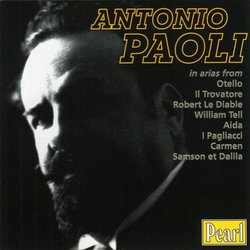| All Artists: Francesco Cigada, Ernesto Badini, Giacomo Meyerbeer, Gaetano Donizetti, Gioachino Rossini, Giuseppe Verdi, Ruggero Leoncavallo, Spiro Samaras, Georges Bizet, Camille Saint-Saens, Umberto Giordano, Carlo Sabajno, Clara Joanna, Giuseppina Huguet, Antonio Paoli, Gaetano Pini-Corsi Title: Antonio Paoli in arias from Otello, Il Trovatore... Members Wishing: 0 Total Copies: 0 Label: Pearl Release Date: 10/20/1998 Genres: Special Interest, Pop, Classical Styles: Vocal Pop, Opera & Classical Vocal Number of Discs: 1 SwapaCD Credits: 1 UPC: 727031002826 |
Search - Francesco Cigada, Ernesto Badini, Giacomo Meyerbeer :: Antonio Paoli in arias from Otello, Il Trovatore...
 | Francesco Cigada, Ernesto Badini, Giacomo Meyerbeer Antonio Paoli in arias from Otello, Il Trovatore... Genres: Special Interest, Pop, Classical
|
Larger Image |
CD Details |
CD ReviewsA first rate Puerto Rican tenor! Impostazione | New York City Area | 12/05/2006 (5 out of 5 stars) "How do I begin? Well, Antonio Paoli had an enormous, vibrant, forward, sometimes hesitant, color varied, pingy, puissant bel canto heroic tenor voice. Lauri-Volpi wrote in Parallel Voices of his massive vibrations that set him, along with Bernardo de Muro apart as the largest of the dramatic voices of his time. Lauri-Volpi also sang during Del Monaco's time. In fact, one could say that Del Monaco's Otello was definitely inspired by Paoli as there are similarities in their tonal delivery - but only perhaps in Otello - (as otherwise) del Monaco recalls Galliano Masini. One could also say that de Muro must have used Paoli as the supreme example for his style of singing in that if played track to track it is difficult to distinguish them especially at the top. The difference being that Paoli used a forward bel canto tone, and de Muro was more chesty in the verismo manner, pushed.
It is exactly that uniqueness of the bel canto approach that distinguishes Antonio Paoli and what may have contributed to his loss of popularity in the height of verismo. His tone is not always beautiful but it is never pushed - ever and it is one legato line. He does not obscure consonants to obtain legato like dramatics in our time. Words have less meaning in our time, which makes sense - expressive artists are generally not employed. Musically, he has an exciting way of creating tension in the line by raising the pitch by a quarter-tone or less, and attacking the notes before the beat on which they fall. He seems gifted to find those oppurtune places in the music. His bel canto method does not prevent any dramatic use his voice, for even though minimal breath escapes in the line, his Pagliacci scenes (on this set) possess supreme accent of dramatic timing and a full exploitation of the chest vibrations which ring more than any singer I have heard. Once again, he possesses bel canto, dramatic, and rhythmic gifts, and here in lies Paoli's contribution, uniqueness, and genius. Paoli is probably the most underrated tenor I have encountered. Yet, a strange tentative quality abides much of the time - the same one Rosa Ponselle battled with." |

 Track Listings (23) - Disc #1
Track Listings (23) - Disc #1